North and East Syria…. Women and The Crisis of the state in MEAN
The women of North and East Syria, with unmatched determination and full capabilities, made 2025 a year of multi-front struggle against all violence, directly instilling fear among jihadist forces across the region.

Berjim Judi
Kobani — Patriarchal domination linked to the state is one of the most systematic forms of violence that has infiltrated the details of women’s lives. This violence, exercised through state laws, security forces, courts, and media, aims to subjugate women and control their bodies, work, and voices. This ongoing patriarchal domination violates women’s right to life, whether in public spaces, at home, workplaces, or even behind prison bars. In response to this oppression, women around the world raise the slogan “Women, Life, Freedom”, continuing to create new paths for life, liberty, and resistance.
Leader Abdullah Öcalan says: “Women must search for and reclaim what has been lost.” Studying and analyzing this statement reveals the core issue: how and where women lost their sacredness, sovereignty, and value. It is equally necessary to uncover the truth in this context.
After more than fifteen thousand years of slavery, violence, torture, subjugation, and domination experienced by women throughout history, they have been able to rediscover spaces where they lost their essence and begin a renewed revolution of life. In North and East Syria, women, through social, intellectual, and political revolution, have paved the way for a new phase of struggle for the freedom of their existence. In 2025, this struggle reached its peak.
State-National Violence… 43 Women Killed
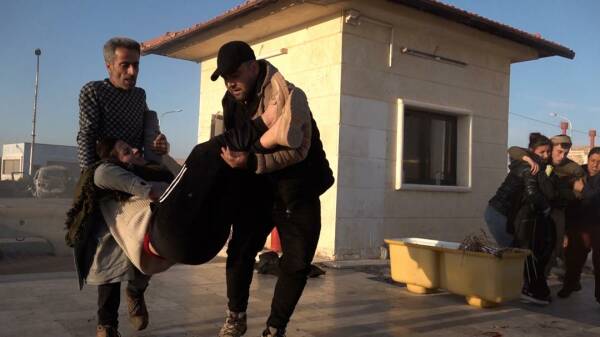
Under the contemporary capitalist system, forces have emerged seeking to consolidate their existence by marginalizing women and denying the reality of society. These forces, facing women’s resistance and uprisings, adopted a defensive stance and launched multifaceted attacks against them. In North and East Syria, women have been at the center of targeting by the Turkish nation-state and its mercenaries, subjected to systematic violence that is neither random nor haphazard but organized and deliberate. It focuses on female leaders and influential social positions, aiming to break women’s will and undermine their role in building a free and resistant society. Over twelve years of the women’s revolution, the Turkish state has continuously targeted women.
According to the Martyrs’ Families Council in North and East Syria, 43 women were killed in 2025 due to aerial and direct attacks, with dozens injured. The statistics indicate that 20 women were killed in Al-Jazira, 4 in Aleppo, 5 in Raqqa, and 14 in Kobani.
Social and Domestic Violence: 75 Women Exposed to Various Forms of Abuse
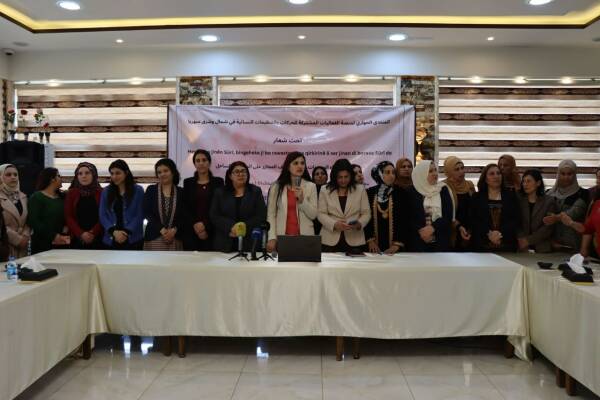
In North and East Syria, where the region has long lived under the burden and complexities of war, different forms of violence have clearly escalated. In 2025, social and domestic violence became particularly evident, including suspicious deaths of women, as well as cases of suicide and deliberate murders.
According to a report by the Sarah Organization for Combating Violence Against Women, during the last six months of 2025, 17 women were subjected to torture, 15 were killed, and 3 experienced direct assassination attempts. Additionally, there were 11 suicides, 19 suicide attempts, 2 cases of burning, 2 cases of rape, and 6 cases of severe psychological impact.
Women’s movements and organizations in North and East Syria see these incidents not as isolated events but as a reflection of a complex reality involving domestic violence, economic pressures, social oppression, and the profound psychological effects of the ongoing war.
According to the Women’s Houses under Kongra Star, a total of 4,477 cases were recorded, with 2,295 cases resolved and 1,246 still under follow-up. Meanwhile, the Women’s House under the Yazidi Women’s Union (Zinobia Women’s Gathering) recorded 1,447 cases, of which 657 were resolved.
Overall, the cases documented by Women’s Houses in North and East Syria ranged from family and marital issues, eviction from homes, torture and abuse, child marriages, polygamy, blackmail, infidelity, harassment, and other forms of violations, reflecting the complex social reality faced by women in these areas.
Forced Migration and State Violence: 19,403 Women Displaced

The Turkish state has occupied many areas in North and East Syria, leading to the displacement of tens of thousands of women who were forced to leave their homes and villages due to military attacks. The Turkish attacks in 2018 and 2019 on Afrin, Serekaniye/Ras al-Ain, and Tal Abyad/Kry Sipi were a major cause of mass civilian displacement, forcing people to seek safety and stability in refugee camps.
According to the Democratic Self-Administration, 14,446 women were displaced from Serekaniye, while 3,617 women from Kry Sipi live in the Tal al-Samin camp for displaced people from that area. In Afrin and Shahba, approximately 1,340 women were displaced.
These numbers reflect the magnitude of the humanitarian disaster caused by occupation policies. Camps in North and East Syria now host tens of thousands of women who have lost their homes and face daily challenges under harsh displacement conditions.
Forced displacement imposed by the Turkish occupation added new burdens on women. Those resisting occupation attacks and social violence are compelled to live under displacement conditions, while managing households, caring for children, and coping with the deep psychological impacts of seeking safety and solutions. In the face of war and displacement, women continue an uninterrupted struggle.
The Social Contract Protects Women’s Rights
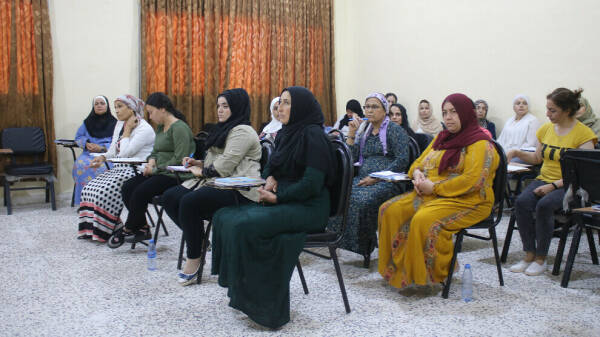
As noted earlier, women in many areas face multiple forms of violence. In response, women’s organizations in North and East Syria have established legal and social mechanisms to combat violence, which form part of the broader development of the women’s struggle in the region. A key mechanism is the Social Contract of North and East Syria, which includes dozens of articles that protect women, criminalize violence against them, and promote their participation in political, social, and economic life.
One fundamental principle of the social contract is that the Democratic Self-Administration is built on democratic and environmental freedom, including women’s freedom as a non-negotiable standard. It also clearly supports community-based women’s economy and strongly condemns exploitation of women in labor and trade.
Organizationally, the self-administration applies co-presidency in political, social, and administrative fields as a way to establish a democratic confederation for women, guaranteeing their rights and freedoms and embodying their vision for building life and governance. Specifically, Article 50 of the social contract enforces strict laws and penalties against all forms of violence and gender discrimination.
Administratively, the Women’s Council in North and East Syria represents women at all levels: communes, councils, districts, cities, cantons, and regions. The Women’s Protection Units (YPJ) serve as a key force for women’s protection. Similarly, the Social Justice Council for Women, through the Women’s House, plays a pivotal role legally. Women’s representation is set at 50%, allowing them full participation.
Educational and Economic Support: Women Protect Themselves From Violence
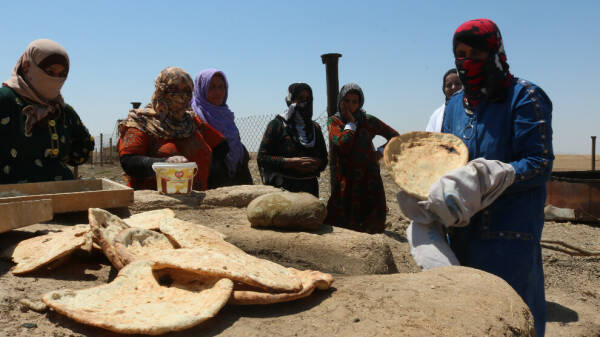
Alongside legal mechanisms safeguarding women’s rights, social mechanisms developed by women’s organizations strengthen collective struggle and solidarity.
Through Star Conference and the Zinobia Women’s Union, diverse educational and economic programs are offered, including seminars, training courses in literacy, education, self-defense, and other activities.
According to the Star Conference Education Committee, within one year, 97 courses were opened, benefiting around 1,500 women, while a course for men included 29 participants. The Zinobia Women’s Union, active in Tabqa, Raqqa, and Deir ez-Zor, launched 37 courses with 678 women participants.
Economically, women work to achieve financial independence and combat domestic violence through collective projects. Star Conference and the Zinobia Women’s Union have established numerous cooperatives and women’s economic initiatives, providing practical opportunities to manage daily life and build independent, participatory economies. Activities include agriculture, sewing, bread-making, handicrafts, trade, hairdressing, and healthcare.
Data shows that approximately 37 women’s cooperatives have been established in North and East Syria, benefiting over 300 women. Despite ongoing blockades and their compounded negative effects on women, these projects serve as an effective tool to strengthen economic independence and resist violence, transforming women’s economic initiatives into instruments of empowerment and resistance, combining social and economic dimensions simultaneously.
With Women’s Knowledge (Genealogy) Towards Freedom
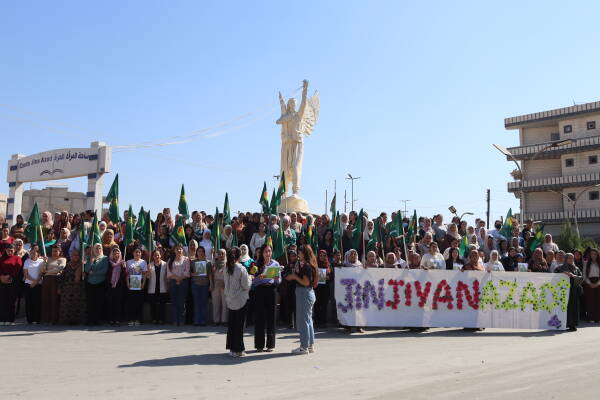
In a world where women have been marginalized for centuries and excluded from sciences long considered the domain of men, women have begun to create a profound transformation through establishing the foundations of Women’s Science, known as “Genealogy” (Jinology).
This discipline redefines knowledge from a feminist perspective. Instead of male-dominated models regarded as the “highest authority,” women build an epistemology rooted in daily life and social realities.
One of the most prominent manifestations of this transformation is Jinwar Village, which embodies this new knowledge model. It is a free space where women rebuild their lives away from male violence, manage their affairs, protect themselves, and develop their capabilities.
This change is not limited to daily life but also extends to education, where women develop curricula that strengthen both individual and collective awareness.
Decisive Stance: Resistance Everywhere
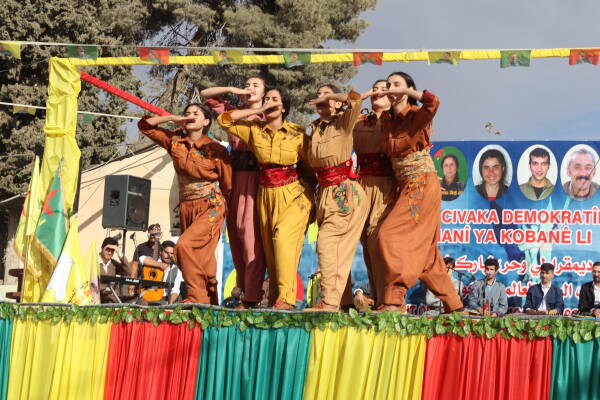
Looking closely at the trajectory of 2025 for women in North and East Syria, it is clear that they have presented a unique model of defending life against all forms of violence and attacks by the Turkish state and jihadist groups.
Women demonstrated unparalleled resistance, rooted in a deep belief in their right to life and dignity, and a steadfast, courageous stance that reached its peak during the defense of the Tishrin Dam. This resilience was not merely reactive; they adopted a profound philosophical slogan: “We are greater than death,” which became the cornerstone of defending the revolution and its achievements.
In the face of social, domestic violence, and marginalization, they expanded their struggle to protect their right to a dignified life at home, in the streets, and in cities. In refugee camps, they rebuilt hope for a safe and transformative life. Women in North and East Syria turned every murder of a woman into a source of strength and progress, presenting in 2025 a collective response through their unity and ongoing struggle.
